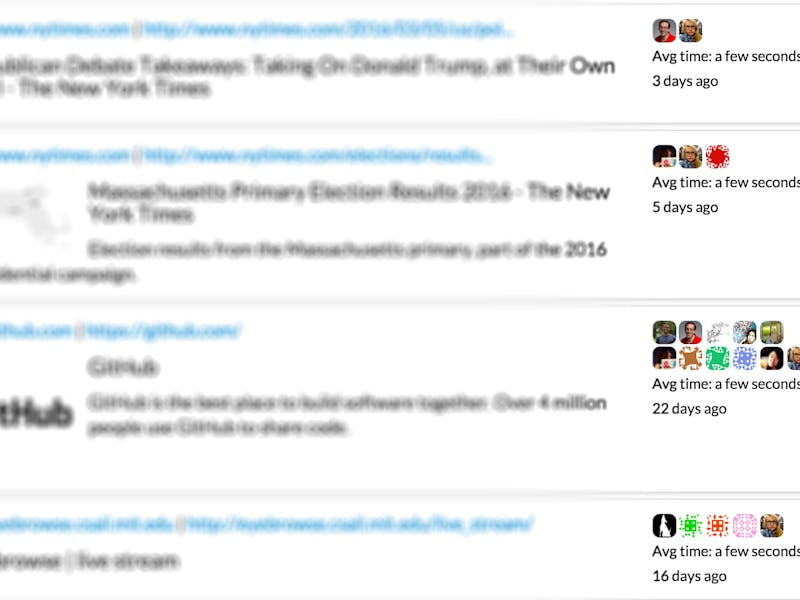Eyebrowse Aims to Socialize Your Web Surfing Experience
The Chrome Extension has the potential to become a more civil version of Facebook and/or Reddit.

There’s a Chrome extension and website — Eyebrowse — that’s attempting to change the way we absorb quality content online.
Most of what you do online these days is tracked. Every time you do anything on Facebook, for instance, you’re telling Facebook about yourself. Entire companies exist solely to gather and aggregate your cursor activity. You have a comprehensive profile that’s been hitherto behind the scenes, shrouded by the curtain that is big advertising. This database of profiles — needless to say — is pure gold. But the users themselves have yet to benefit.
The abundance of information you already give up to the great wide web by choice is amazing. Nothing is sacred: A private moment of reflection on a mountaintop becomes Instagram fodder without your consent when someone thinks “grammable” and snaps your photo. A grocery store run prompts a tweetstorm. Governance is reality television — pure, gaudy entertainment — and (say, post-debate) the resultant unmediated social media hot takes abound.
And yet, your web browsing is supposed to be sacred. It’s the last refuge. Yet the oasis is, as oases often are, an illusion. After a long day of work you retire to the sofa and open up an article on, let’s imagine, the newest dating app; you glance around, slightly embarrassed, to ensure that your roommate is not nearby, and then continue to read. Ah, you almost reflect: At least here, online, I am spared.
The reality, of course, is that you’re not spared. That article appeared on your Facebook News Feed. You hovered your mouse over the link, unsure, and then decided to click. Facebook noted and stored that choice. Facebook also noted and stored the duration of your visit. Facebook puts this information to work for you and for your friends — next time you log in, you’re more likely to see such articles; friends whose tastes are compatible with your own may also have a higher likelihood of seeing your articles. Advertisers pay to figure you out, to know what ads to send to which people.
And yet let’s imagine that 15 of your friends also read that article, and 10 of those 15 spent a not insignificant amount of time reading that article. Eyebrowse aims to make this information known — the same information that is already collected by the ubiquitous trackers. It’s like going for a Sunday adventure, except it’s now a virtual adventure. In the real world — if you’re a normal, insane, young adult — you’d share each step of your journey. Instagram, Twitter, Facebook, what-have-you. Your analogous journey in the virtual world of the internet remains under wraps.
And that’s where Amy X. Zhang, Josh Blum, and David Karger come in. The trio recently presented a paper on behalf of their Chrome extension and website at the 2016 Computer-Supported Cooperative Work and Social Computing (CSCW) conference. The extension, Eyebrowse, aims to socialize web browsing. Upon installing the extension and creating an account, you’re met with prompts at each new website you visit: “Share activity from nytimes.com?” (Unfortunately, this prompt seems somewhat unreliable. Either way, your information will not be shared unless you yourself allow Eyebrowse to share it — so, unless you either click “Yes” in response to the prompt or, within the extension, select the “Mark visit to this page” or “Share this domain” options, you won’t share any information.)
Why yes, Eyebrowse, I would like to share activity from en.wikipedia.org. Thank you for asking.
Even when you do choose to share that information, the extension collects scant information from your visit: Along with logging the time you enter and exit the site, it collects the “url, the domain, the title, and the favicon.” That’s it. Then, if you’ve chosen to share from the website in question, it posts that information to your public Eyebrowse profile. (Like any social media, you can follow people and yourself have followers.)
The modus operandi for surfing the web seems to be browse until your eyes fall out and only share the most compelling links, videos, or images that you encounter. Only share the sort of content that coaxes sentiment from your soul. Eyebrowse would like to shift that paradigm, and shift the power from advertisers to users. That way, the sites you visit, articles you read, and videos you watch that do not make the sharing cut — but no less hold your attention for some time — will be noted.
The dropdown menu for the Chrome extension itself.
If several friends also spend time consuming said content, then Eyebrowse’s Firehose will reflect the fact that it is compelling content. You can sort the Firehose in the following ways:
- Top
- Most Visitors
- Long Reads
- Most Notes
- Most Recent
And you can also change the way you visualize the data. Right now, there are three options: Wordcloud, Day of Week, and Hour of Day.
Below is an example of a Wordcloud visualization, in which larger words represent popular content:
new trump google york times
Eyebrowse’s current downfall is its dearth of users. The Chrome extension page counts just 62 users, and only about 50,000 “history items” have been collected. But, with enough users and enough history items, Eyebrowse has the potential to become a more civil version of Facebook and/or Reddit. It’s less intense, insofar as you do not need to go out of your way to share or discuss content (the extension is built in to Chrome itself), and provides a better metric for judging content.